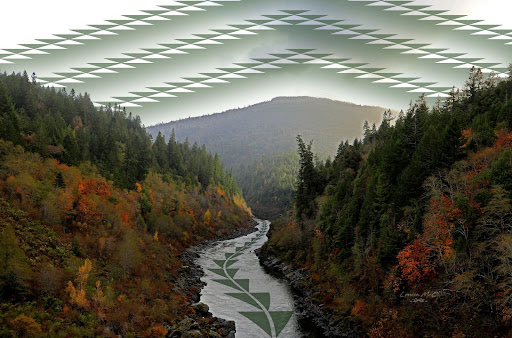Overview
Live in Balance with the Natural World - Take Only What You Need

Authors and Contributors:
- Katie Smith, M.A.Ed.-Yurok Tribal Citizen, Teacher-Castle Rock Charter School Del Norte County Office of Education
- Maggie Peters (Yurok/Karuk), NASMC Learning Specialists Humboldt County Office of Education
- Yurok Tribe:
- Jim Mcquillen, PPS MFT, Yurok Tribe’s Education Director, California State Board of Education Member
- Victoria Carlson, Yurok Language Program Manager
- Brittany Vigil-Burbank, Yurok Language Program Distance Learning Coordinator
- Matt Mais, Public Relations Manager
- James Gensaw, Yurok Language Teacher, Yurok Tribe’s Language Program Cultural Coordinator
- Barbara McQuillen, Yurok Language Program Collections Coordinator & Lead Teacher
Grade: 4
Suggested Amount of Time: Three 60-80 minute sessions
Curriculum Themes
- History
- Cultural Strengths
- Law/Government
- Relationship to Place
- Cross Curricular Integration
Learning Goals
- Analyze the difference between sustainable harvesting and overharvesting natural resources.
- Understand how traditional beliefs promote sustainability, community, and balance with the environment.
- Experience Yurok Language. Language is a vital aspect of identity, cultural heritage, and worldview. By integrating the language into this lesson, we honor the Yurok cultural legacy and provide an authentic lens through which students can connect with and better understand Indigenous ways of life. Language revitalization is essential in maintaining cultural continuity and fostering respect for Indigenous peoples today and in the future. Please click the audio playback buttons to hear the language as you navigate the lesson.
- Identify important food resources of the Yurok people.
- Appreciate traditional ecological knowledge of Yurok people regarding natural resource management
- Understand how traditional beliefs promote sustainability, community, and balance with the environment.
- Analyze the difference between sustainable harvesting and overharvesting natural resources.
Lesson Overview
This lesson immerses students in the Yurok Tribe's rich cultural heritage and their deep-rooted connection to sustainable environmental practices. It explores the tribe’s traditional beliefs and practices related to natural resource management, focusing on the values of sustainability, community well-being, and ecological balance. Students will learn how the Yurok people prioritize responsible resource use, such as with salmon, Pacific lamprey, elk, and seaweed, ensuring these resources are available for future generations. The lesson highlights key principles such as respect for the land, the interconnectedness of all living things, and the tribe’s commitment to maintaining environmental harmony. Additionally, students will gain insight into how Indigenous knowledge contributes to modern environmental stewardship and sustainable living.
Incorporating Yurok language throughout the lesson, students will be introduced to important terms related to natural resources, fostering cultural understanding and appreciation. Engaging videos featuring members of the Yurok Tribe will provide an authentic connection to their traditions, offering students a direct link to the people and practices discussed. The lesson culminates in a hands-on learning experience where students are challenged to sustainably harvest salmon for their community, balancing the need to nourish people with the responsibility of ensuring that fish populations remain healthy and thrive. By the end of the lesson, students will have a deeper understanding of the Yurok Tribe’s role in environmental stewardship and how their practices can inform sustainable living today.
Teacher Background
The Yurok Tribe, indigenous to the northwestern coast of California, has long upheld a deep spiritual and cultural connection to the land and all of its natural resources. Their traditional beliefs and practices emphasize the interconnectedness of all living things and the responsibility to maintain balance within the environment. The Yurok people view natural resources—such as rivers, forests, and wildlife—not simply as commodities, but as relatives and vital components of a larger, sacred system of life.
At the core of Yurok resource management is the principle of sustainability, ensuring that resources are used in a way that allows them to regenerate and support future generations. Traditional ecological knowledge, passed down through generations, guides the Yurok in practices such as controlled burns to maintain forest health, sustainable fishing techniques, and ceremonies that honor and acknowledge the land and its cycles. These practices reflect a holistic approach that integrates cultural, spiritual, and ecological values to promote long-term environmental stewardship.
Community plays a vital role in Yurok natural resource management, as decisions are made collectively to benefit the entire tribe and future generations. This communal approach fosters a sense of shared responsibility, respect, and cooperation in caring for the land, water and wildlife. The Yurok people’s emphasis on reciprocity—taking only what is needed and giving back to the earth—ensures a balanced relationship with the environment.
Educators can use this background to help students appreciate Indigenous perspectives on environmental stewardship, recognize the value of traditional ecological knowledge, and understand how Indigenous communities like the Yurok have successfully sustained their natural resources for thousands of years. By incorporating these teachings into the classroom, students can develop a broader understanding of sustainability that includes cultural and ethical dimensions.

